The Millennial’s ‘She’s Gotta Have It’ **Spoiler Alert**
**Spoiler Alert** Your Friendly Neighborhood Netflix Binger's Character Overview and Unsolicited Opinion on the 'She's Gotta Have It' Reboot.
Over Thanksgiving weekend, the beloved and adored Spike Lee released his second coming, in the form of a mini series, of the 80’s film She’s Gotta Have It. As an Afro-wearing, black art loving, African American, feminist, millennial, I felt it my duty to tune in; and tune in I did, to all ten episodes...in one night. Here are my findings, and let me be real, this will not be your Refinery29, IMDb, Rotten Tomatoes 🍅 kind of review. I’m a black girl, a black artist, a black feminist, a black—everything, so I won’t insult anyone by pretending to be unbiased; nor will I create this falsehood where that doesn’t matter. I am honest, though, if that counts for something. So let’s jump right in!
Boys, Boys, Boys
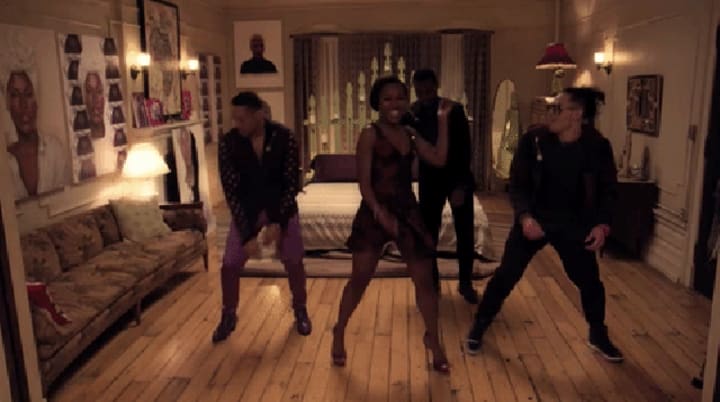
Gif by HollywoodPoint
Let me start by saying Spike Lee has been a part of some of my favorite projects. I’m a 90s baby with 80s siblings, so most of my childhood was filled with old school black art, music, TV shows, and movies. With that being said, I had some very high expectations for this.
Spike had me glued to the TV with my Thanksgiving leftovers fresh out of the microwave from the first five minutes, no exaggerations. Any woman who has walked down any overcrowded street in any overly priced city can relate to the showcase of cat calls Spike so expertly nailed to the T. From how the men look, to what they say in hopes we’ll stop and chat it up with them; It. Was. Perfect. Not to mention the intro monologue done by the star of the show, Nola Darling, opening the viewers eyes to the kind of easy-going, non-labeling, free spirit she is; it was built to grab you by the hand, sit you down, and prepare you for what’s to come—and that is the introduction to all the smooth, crazy, narcissistic men in her life.
#JamieOverstreet
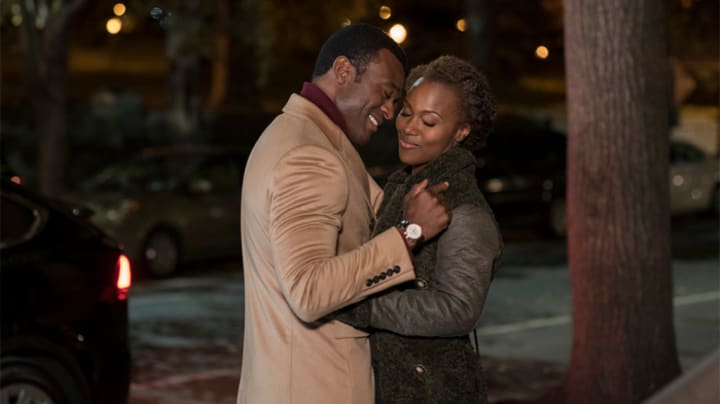
Screenshot from Netflix
He starts off with Jamie. Jamie started off as my favorite, for sure. He was suave, he was well dressed, good looking, and wasn’t afraid to express how much he needed Ms. Nola. He was the man women saw themselves being with, and simultaneously the man men saw themselves becoming. Well put together, great in bed, caring, loving, patient, and kind. Yet as the series unfolds, we begin to learn just what’s underneath all of those tailored suits; a marriage being the most shocking revelation to myself. We see just what kind of man he is, and I’m surprised and at the same time relieved and at the same time disappointed. So many mixed feelings are left with Jamie. Should I like him for being such a great guy when she needs him to be, buying her art, supporting her in her endeavors, everything a grown man is to someone who is so much younger than himself? Now, don’t cringe, because we all know those relationships. Not necessarily a sugar daddy, but definitely not boyfriend material. He’s more of a guardian—some kind of guidance, more than anything. The only thing Spike puts on the forefront that most keep in private, is that they have sex. Then I look at him again and wonder: should I feel disgusted? He’s married. “Separated," but married. He still lives at home with his wife, but they don’t share the same bed, except one time towards the end, let alone the same space—he’s confined to the basement. They have a son together, who’s in private school and a confused light skin black boy who's unsure about his place or where he fits in, from the little snippet we get of him. This is what put me off the most. Even though he is separated, you can still see the care he has for his wife, however little it may be. This part of Jamie is a little too reminiscent of those men cat calling in the streets. No pride, no dignity, just a man with needs looking to fill a void in his life that has been created by 10+ years of monogamy. Nola doesn’t mind being the other woman though, until it messes with her money, and then she slowly drifts away from him. Then I look at him again and see the dark, mysterious Jamie, who was caught up in some kind of street life. Spike doesn’t go too much into this one here, and if he did a second season, I would love to see this Jamie brought to light. Although I guess that wouldn’t make that part of him so mysterious. Jamie is a complicated character which is off-put by the second introduction.
#MarsBlackmon
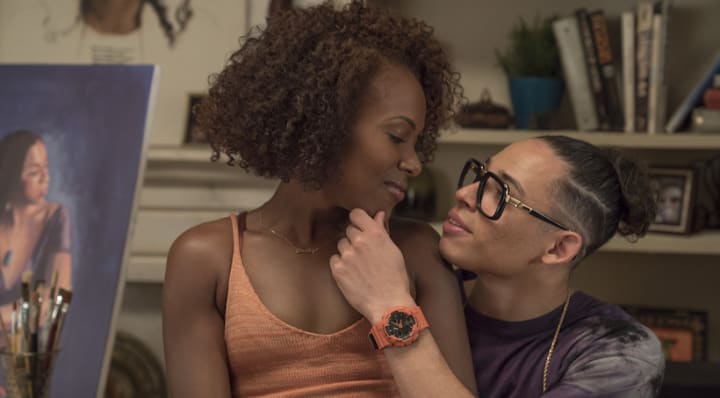
Screenshot from Netflix
Please mami, please mami, mami, mami please! If I could LOL right there and not seem too millennial, I would! Mars Blackmon, the craziest of them all. He’s a mixed breed, rap loving, name chain wearing, dyslexic riot. This man is something else, entirely. Think Brooklyn-born Puerto Rican fire, and Brooklyn-bred Afro eccentricity. He’s my favorite, so I’m definitely predisposed to his whole demeanor. Mars is a young blood. I probably like him so much because he’s so relatable to the twenty-something guys I encounter everyday. He's full of life, rides a bike any and everywhere, and apparently with anything, as we saw from him toting Nola's precious artwork to a gallery opening. He's fun, he's loving, and has an amazing Yoruban priestess for sister. He believes in the power of laughter as healing and is hilarious in each and every scene. He's simple and no amount of words could do him justice. He has a story for everything, even if some of them aren't true, and is down hard for Nola and the block. Watching him unfold is like watching a rose bloom in fall; beautiful to no end. Which brings me to the final introduction.
#GreerChilds
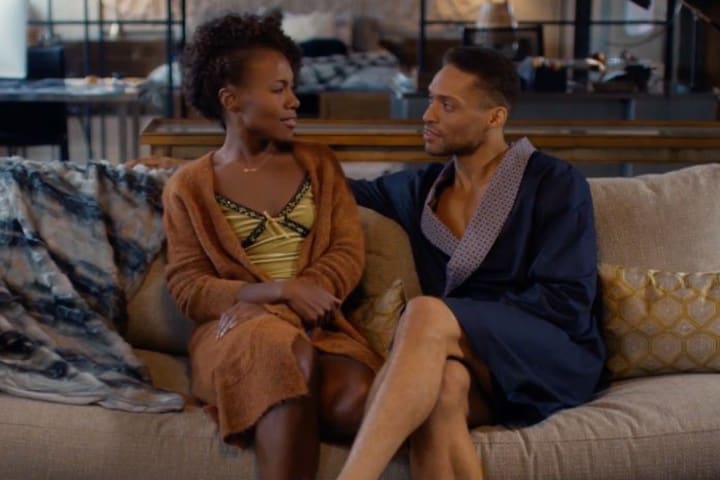
Screenshot from Netflix
Greer (insert eye-roll emoji). What can be said about this man here? The first scene shows you exactly who he is, and rarely does he waver. He was by far the most annoying, narcissistic, self-centered man I have ever seen on screen. Everything he did was in service to himself, and I'm sure he only made love to Nola because it made himfeel good. Looking at him, listening to him, experiencing him, we can't help but to be agitated. He is a European black, who clearly cannot relate to BK, New York. He's a photographer who knows no bounds when it comes to other individuals, and this is paraded very well in the way he speaks to people and encroaches on their personal space, making the whole situation uncomfortable; but he's a ladies man. Greer is handsome, there is no denying that. He is, without a shadow of a doubt, the best looking between the three, unless you prefer older men, or guys with a little too much hood in them. He reminds Nola every chance he gets how beautiful she is, but also how lucky she is to have met him, that's what really gets on my nerves. We don't watch him unfold. He is Greer, he doesn't change. He is self-centered the whole way through and is a constant in the series that is comforting, yetvexasperating.
Girls, Girls, Girls
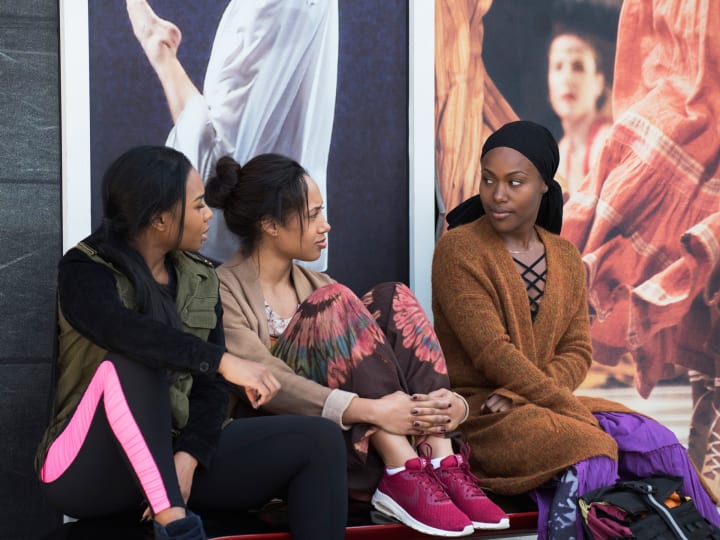
Screenshot from Netflix
Spike's depiction of women certainly left much to be desired, I won't lie about that. He has never really been the best when it comes to depicting the female mind, or the average one, that is, and this definitely is apparent with his supporting roles of Nola's friends. They are close knit but assuredly still have weird harbored feelings against each other; This, which is common in a lot of women's relationships with the same sex today, makes for a very uncomfortable watch from the outside looking in. Are we really that petty? Do we really speak and act this way towards other women? It could be true, but it could also be a man's point of view that is over-exaggerated and highly unlikely. The women in Nola's life are just as interesting as the men, though, so let's dive into those.
#OpalGilstrap
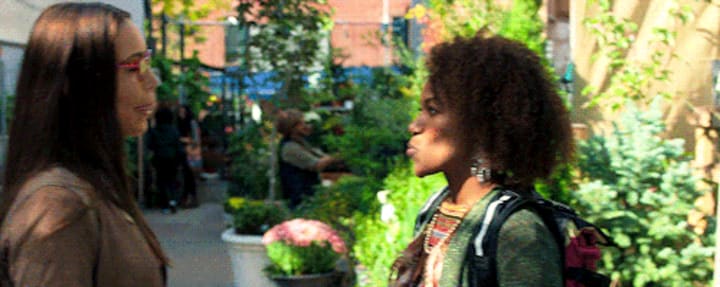
Gif by Bois Meet World on Tumblr
Let's have a look at Opal. Of all the characters, men and women, she is probably the only one with her life together, and that's pretty dope. Now, in the original movie, Opal's advances were not welcomed. Nola might've teased her a bit, but was very steadfast in her love for men and the way they made her feel. Now, here, Opal's advances are the only one's that make Nola want to change her mind about the poly-amorous juggling she's doing in her day to day life. Opal is the most polished of the people in Nola's life. She's not bisexual, she's a lesbian who sees the potential in Nola. Sometimes the potential Nola doesn't see in herself. She has a daughter, and is very serious about not mixing the signals that her daughter receives, and I have the utmost respect for that, being a pan-sexual mother myself. Opal, who is some kind of nursery owner—hydroponics or horticulture or something like that, is a wishy washy character, though. I believe she is consistent in her own life, and in her daughter's life, but when it comes to Ms. Darling, it's hard to tell. Even though, in all fairness, it's hard to tell with Nola, too. Their relationship blossoms on and off, and is never really stable, but it does make for a good curve ball. There's much to be left to the imagination when it comes to Opal, and I like it, but it also makes me yearn for and expansion of the show, because I need to know more about her.
#ShemekkaEpps
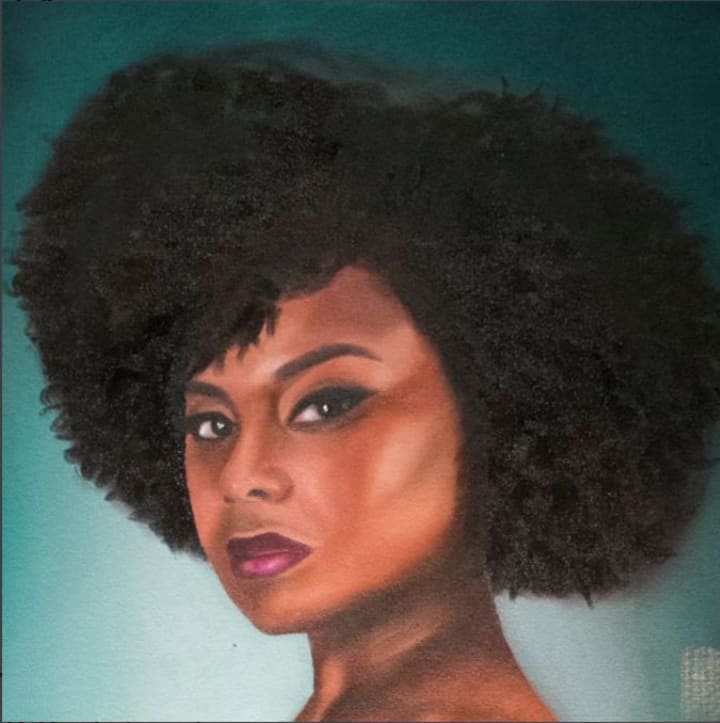
Photo by @shesgottahave on Instagram
Mekka, baby girl...If I could talk to this woman just one time to see where her head is at. Shemekka, who goes by Mekka for all intents and purposes, is a very stereotypical black woman; such and archetype, in fact, that it's slightly disappointing. She is a working single mother with baby father drama, who lives with her mother, works in a dance club, and has serious body issues that end up endangering her welfare. Sounds like someone we all have seen or heard of. I feel for Mekka. She's an opinionated Jamaican woman who probably has some self hatred rooted in her bones, despite her being as beautiful as she is. She definitely exhibits some common "hood"-like mannerisms. The way she speaks, her whole approach on life, is very evocative of someone who has had to struggle more than they would have liked to, more than anyone should have to. She wants to do her best for her daughter, but also probably is a little self serving when she gets her botched injections. You. Heard. That. Right. This amazingly gorgeous black woman felt her best move, for her career and for herself, was to go to some motel in the middle of God knows where, and stuff her backside with "silicone," if that's even what that was. Nola is by her side for every decision she makes, though. Even if they seem like polar opposites, their friendship is one that is very relatable. You can tell there's some serious history there, and that is something I would love to see unfold a little more in another season. Their interactions with each other were too minimal for me to truly understand who she is, which doesn't do her justice for the role she plays.
#ClorindaBradford
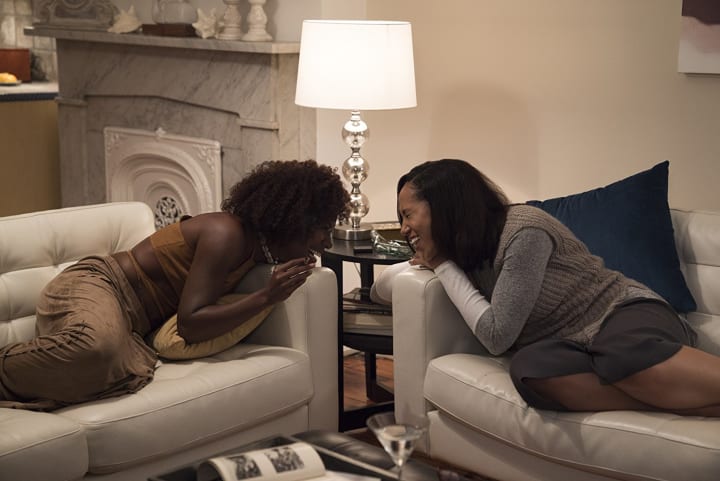
Photo by David Lee/Netflix
This is by far the weirdest relationship in the entire show. Why? Nola stole Mars from Clorinda. Bam! I lead with this because Clorinda leads with this the entire season. It's like okay, we get it, she stole your man, but knowing what I know about Clorinda, I'm sure they were not a good match for each other in the first place. Clorinda is something in the art world. I don't know the official title for it. She's definitely, what seems to be, overworked and underpaid. From the looks of it though, she loves what she does. In most instances we see her, she's wound up a little too tight; always stressed about something or over-explaining herself. Watching her maneuver her life is tiring. This, among other things, is why I can obviously see why her and Mars wouldn't have made a good fit, anyways. Clorinda is literally a ball of tension, and she transfers that energy everywhere she goes. Whenever the girls (Mekka, Nola, and herself) all get together, she just drags along like a cumbersome weight, with her over-hanging cloud of rigidity. I don't like this depiction of her, though. The Clorinda from the original was a little more 'lax but still serious at the same time. This Clorinda is all the time serious, and it's annoying. Spike's illustration for the black, educated woman could have come off as a little more natural. These types of women don't settle for less, they don't take any b.s., but at the same time, most of them know where they came from and are humble in that regard. Clorinda is the exact opposite, and that's disheartening for me.
A Touch on Mental Health ...
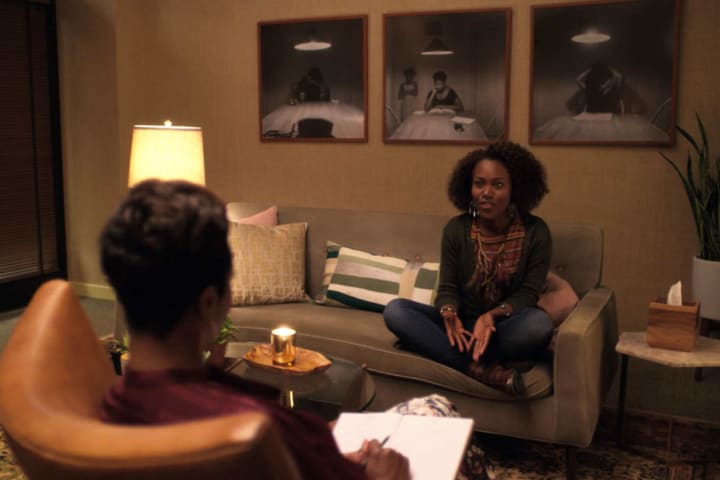
Screenshot from Netflix
This is my most revered inclusion to the series. The exploration into mental health was so relevant, and so necessary for this remake. Mental health has become such a touchy subject in the past decade, for reasons unbeknownst to me, but I realize it's importance because I've been there. Most black women, most women—hell, most people have been there, or, more importantly, need to be there. There wasn't much wrong with Nola, not from the outside looking in, anyway. She only began to see a therapist after she had been physically assaulted by a man on the street, who obviously had no home training. What makes this so substantial, is that she recognized an issue in her life, she awakened to the fact that it was effecting her work, her passions, her interactions with other individuals, and she took her friends' advice to get help. That is not something you see very often. Most series have them confiding in friends, family, or the like, only to be treated like it's a little hill to get over, when most of the time, that's not the case. The prolonged use of a mental health professional in a predominantly black series is almost unheard of. I believe it adds a texture to the cloth of the show that you don't see frequently, so this sent it over the edge for me.
A Touch of Desecration
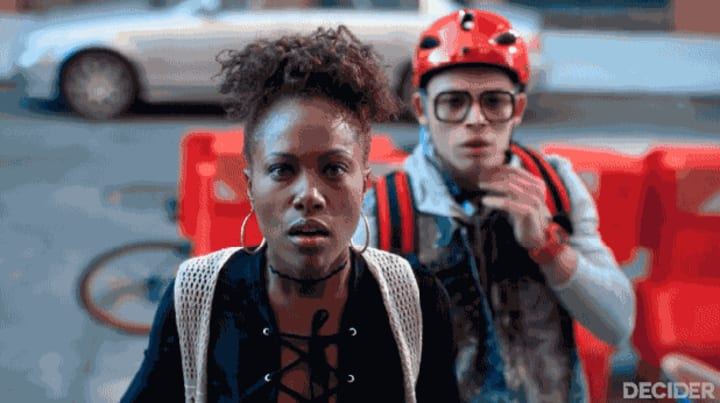
Gif by Decider
"My name isn't" was the fruition of every woman's frustrations, stemming from being called out her name in an attempt to get her attention, or as a result of a spurned advance, and it's marvelous. Someone had to say it. Someone had to step up and publicly voice that, just because we don't want to give someone our time, doesn't mean we deserve to be treated less than the queens that we are. I mean, they're the ones that wanted to get ourattention in the first place. Nola's destroyed artwork was a notable representation of how most people see our complaints for being treated subordinate to the opposite sex.
#NolaDarling
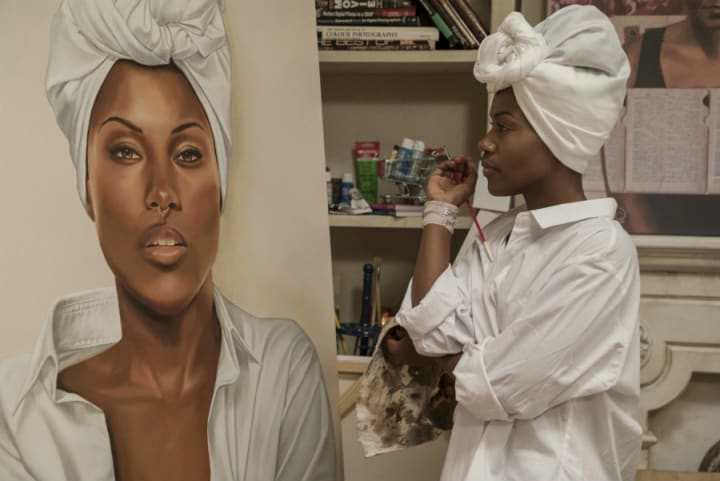
Screenshot from Netflix
Ms. Nola Darling. I saved the best for last. So much can be said about the protagonist. Who is she? What does she stand for? Where does she belong? How can we label this moving force of pulchritudinous art? The answers? She is who she is and she's unapologetic in her actions and the way she moves about life. She doesn't care what other people think about her and her relationships. That's what makes her so fierce. At the same time, however, she's very similar to many of the black female leads in most TV shows and movies. There isn't much that makes her different from Olivia Pope or Annalise Keating. Domineering yet nonchalant yet autocratic yet tolerant; it's honestly a group of character traits I'm so tired of seeing. I can only watch one show with this type of black woman at a time. I appreciate the powerful black women in play here, but not every woman is the same, not every compelling woman's story is the same.
What does she stand for? The answer is any and everything she believes in. Again, a sameness I see here with every other African American female lead, but a prodigious quality, nonetheless. When she takes an arrest for Chapo after her gentrifying neighbor gets out of line, it's admirable. How many people would be willing to go to jail—for a homeless man, no less?
Where does she belong? Right there in the midst of the whitewashing of Brooklyn. She is a black woman living her black life in the neighborhood she knows best. The neighborhood she probably hopscotched in; the roads she most likely double dutched in; the stoops she plausibly sat on and thought about what she'd be when she grew up. She also belongs in a class of women who we see on screen often and in life less. She signifies a class of black women that only exist in surreal life. It's inspiring to watch on Netflix, but unrealistic for the average woman of color. So carefree, living life how you choose, when you choose, with whom you choose, is not a luxury that most of us can afford. I guess that's what makes it such a good watch.
How do we label this gazelle? We don't.
I think what I took away from this all is that maybe we should stop trying to fit people in these boxes, stop trying to fit ourselves in these boxes, and just learn to live. Learn to have the cake, and eat it too. It's not like we can't take pictures and admire it later while we savor it's goodness. Learn to be who you are, and not who you think you are. Learn to cherish the moments that you're in, because there may never be another one of these exact same moments, with these exact same feelings, ever again in your life. Enjoy living. Enjoy every breath you take, even if someone thinks you're selfish for doing so.
She's Gotta Have it. You're damn right she does.
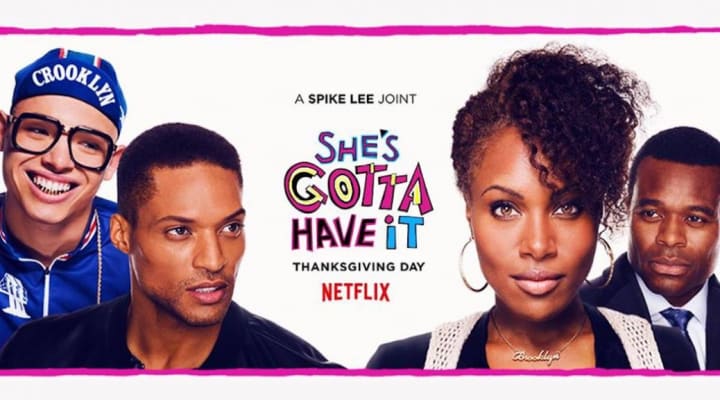
Photo by REIGN at WDKX.com
This show was something. It was enlightening, to say the least. It showcased a woman's point of view of her men, and a man's point of view of his woman, how girlfriends fit into there—platonic and otherwise—and everything in between. For the 70s and 80s babies, this reboot may not be for you. If you cling to the original like a good pair of boots in the middle of winter, this may not meet the mark for your expectations. But as a millennial who has a vague memory of the original movie, this gave me life.
I would say: keep an open mind. Don't watch the original and then watch this, because then you'll already have a formulated opinion that may not be done justice by the new series. Instead, watch this first, take in the changes, and be cognizant of how relevant they are to today. Realize who is watching this, and then distinguish if it was a masterpiece. Coming from an Afro-wearing, black art loving, African American, feminist millennial, it was a classic.
About the Creator
Inae'e Aidoo
Finding myself daily in God's word, but from what I can tell I'm a mother of soon to be 3, with one that's already a seven year old princess, wife to an amazing supportive husband, and a vessel to help create peace, mostly within oneself.




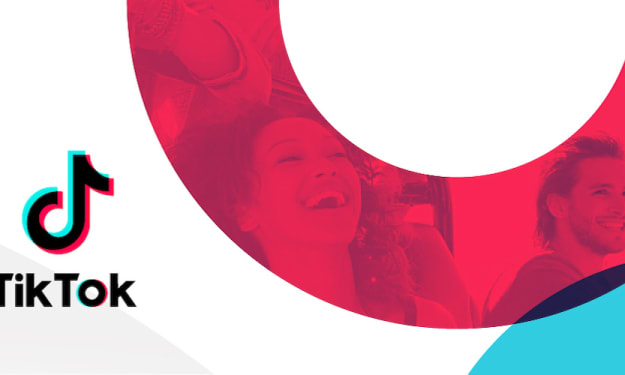

Comments
There are no comments for this story
Be the first to respond and start the conversation.